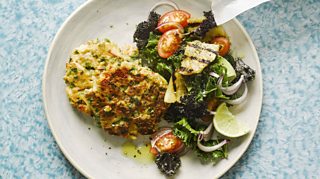What can I do about climate change? Here are 10 practical ways to reduce your impact
Concerned about the environment and climate change but not sure what action you can take?
Βι¶ΉΤΌΕΔ Radio 4’s Woman’s Hour asked for advice from Kate Cawley, owner of Veris Strategies, a sustainability agency advising people who make and package food products, Dr Lucie Middlemiss, Associate Professor in Sustainability at the University of Leeds and Lauren Bravo, author of How To Break Up With Fast Fashion. Here are their 10 practical tips.

1. Try and buy food locally
“Local can just mean British, because importing food has a huge carbon footprint. Anything from meat, dairy, that kind of thing. Just buy local,” says Kate Cawley, owner of Veris Strategies - a sustainability agency advising people who make and package food products. “I think when people think about local they think, ‘supporting our local butchers’, the immediate locality, but it’s actually just about buying British.”
Next time you need an outfit for a party, or an event, send a message out on WhatsApp... see if people can lend you some clothes.Lauren Bravo, author of How To Break Up With Fast Fashion
2. Stop clothes shopping for as long as you can
“It’s not possible for everybody, but if you can take even a month off buying new clothes from the high street, it can make a big difference both to your impact and resetting your mindset a little bit,” says Lauren Bravo, author of How To Break Up With Fast Fashion. Lauren also gave up buying new clothes for a year at the start of 2019.
3. Consider the packaging when buying food
“Packaging is a really quick win,” says Kate Cawley. “Consider how you are buying food when you are going into the supermarket, or even online. I think there is now the opportunity and supermarkets are open and welcoming and offer solutions for this. If you are buying and you receive excess packaging, you can give it back so they can make sure it’s responsibly recycled. At the moment, a lot of products you can’t actually recycle in the home environment. I think some people are not aware that they can give it back to the supermarkets to deal with.”
4. Swap and share clothes
“I’m a big advocate of clothes swaps,” says Lauren Bravo. “There’s an organisation called Swap Rebellion that organise clothes swaps in London at the moment. If you look locally to you, there are organisations all over the country, people who are setting up their own clothes swapping events. That can be a great way of getting a new wardrobe without having to buy anything new."
We get sucked into buying the deals we see, for example, buy one get one free. Only purchase what you actually need.Kate Cawley, owner of Veris Strategies, a sustainability agency
"Next time you need an outfit for a party, or an event, send a message out on WhatsApp, talk to your friends, see if people can lend you some clothes. We don’t need a new outfit for every single wedding. Think about borrowing from other people before you go and buy.”
5. Only buy what food you need
“Food waste is a massive issue,” says Kate Cawley. “We get sucked into buying the deals we see, for example, buy one get one free. So only purchase what you actually need and value the food more and don’t waste it.”
6. Get crafty with a needle
“I’m not expecting people to get dress-making from scratch...but if you can master just a few really basic sewing skills...that can make a massive difference to how often your clothes get worn,” says Lauren Bravo.
“Have a look on YouTube, there are loads of tutorials on there. If you’re prepared to alter your clothes, even things like putting up a hem, taking off a collar, changing some sleeves, things like that...and being prepared to mend clothes when they wear out. When you’ve got a hole in something, got a stain down something, don’t throw it away, don’t give up on it, think about how you can adapt it and still get some wear out of it.”
7. Moderate your meat and dairy intake
“It’s really important to moderate your meat and dairy intake because that does naturally have a higher carbon footprint - you’re raising an animal,” says Kate Cawley. “We need to embrace a more plant-based lifestyle. I think there is an important role for meat and dairy but I think it’s about buying better as well.”
8. Look for sustainable fashion brands
“There are some exciting sustainable brands coming along,” according to Lauren Bravo. “Some of them can be more expensive, so it’s certainly not an ideal solution for everybody yet. But there are some wonderful brands."
"One of my favourites is Birdsong London - they work with groups of female refugees in London who are trained up to hand paint T-shirts and to sew clothes. They are paid a fair living wage, it’s a positive working environment, the clothes are fantastic, they are very much designed for all women’s bodies. They have a ‘no Photoshop’ and ‘no sweatshop’ motto which is brilliant. There’s lots of other websites around. Follow some sustainable fashion hashtags - that can be a good way of discovering new sustainable brands you haven’t heard of.”
9. Hit up your local charity shop
“They are still far and beyond the best way to find low cost, sustainable clothing,” says Lauren Bravo. “Donate. Feed the circular economy. The more people who donate to charity shops, the wider the range that will be available in charity shops for people to buy."
When you’ve got a hole in something, got a stain down something, don’t throw it away... think about how you can adapt it.Lauren Bravo, author of How To Break Up With Fast Fashion
"It’s really important to remember, never send anything to landfill, take a bag of clothes to your local charity shop even if you don’t think it’s going to be resalable condition. They can always be recycled for something. Oxfam has a big waste saver plant. They can turn old clothes into stuffing and insulation. Nothing ever goes to waste.”
10. Use your voice
“You need to challenge the supermarkets, you need to challenge the retailers that you buy from to question them about their credentials, the provenance of their products,” says Kate Cawley. “Consumers, especially with social media, can hold businesses to account now and I think it’s really important that we support organisations that can do this for us, en masse and use our collective voice."
"Currently under consultation from the Government is the national food strategy, which is being headed up by Henry Dimbleby. It’s currently out for consultation and everybody can have an opinion on it. So I would really urge people to Google the National Food Strategy and fill in the survey. If you feel passionate about the food system and making it more sustainable, then now is the time to have your say.”
"Raise these issues in your workplace if you can," says Dr Lucie Middlemiss, Associate Professor in Sustainability at the University of Leeds. "Many employers are thinking about their impact on the environment, and they tend to respond well to employees supporting this activity."
Dr Lucie Middlemiss adds that it's important to "remember that environmental action can be challenging, time consuming and expensive. Avoid being judgmental of other people’s efforts. Instead try to include them by showing how they can be a part of the solution."
You can listen to the full Woman’s Hour discussion on women and climate change here.
Woman's Hour is on Βι¶ΉΤΌΕΔ Radio 4 on weekdays at 10am and at 4pm on Saturdays. You can catch up with all episodes via Βι¶ΉΤΌΕΔ Sounds.



